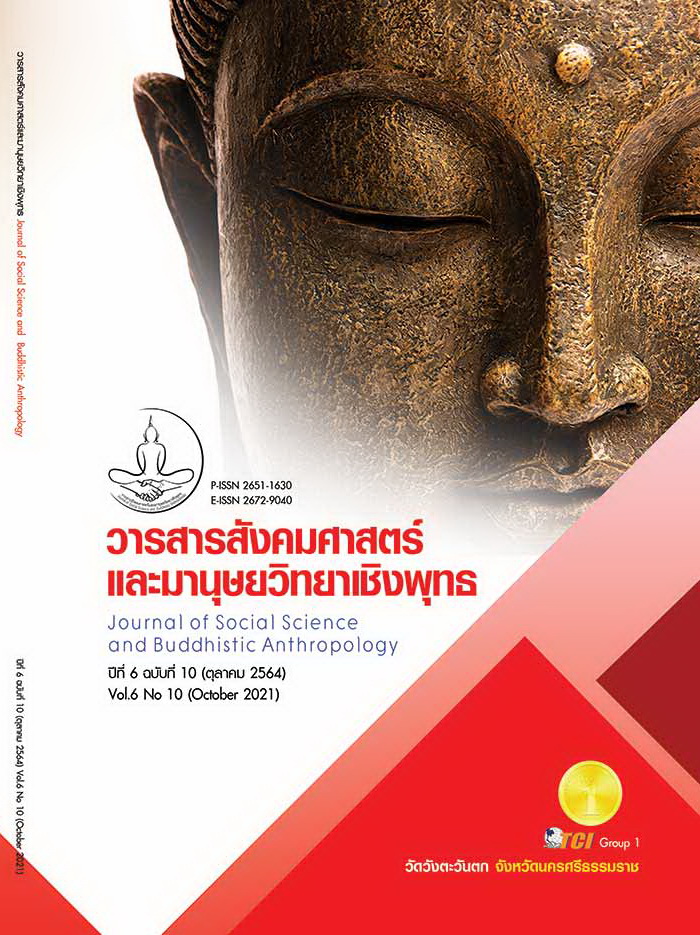CULTURAL CONCEPTS IN HISTORICAL PROJECT BY PREM TINSULANONDA NAKHON RATCHASIMA PROVINCE FOUNDATION
Keywords:
Cultural concepts, Historical project, Prem Tinsulanonda Nakhon Ratchasima province foundationAbstract
The objectives of this research article were to study the cultural concepts including cultural landscape, collective memory, identity concept, and cultural values from the historical project that was awarded from the Regional Student Project Contest organized by Prem Tinsulanonda Nakhon Ratchasima Province Foundation during 2014 - 2018 in 50 subjects. The study was analyzed by using documentary research and analyzing data from the text. Characteristics of the cultural concepts were studied such as cultural landscape, collective memory, concept of identity, and cultural values. The research was presented in the form of analytical description. The results of the study showed that cultural concepts are applied in the history project in accordance with the study of history and culture in foreign countries as follows: 1) cultural landscape were found in describing community settlements, the origin, name importance, beliefs about space, and changes in the area that affect the community 2) collective memory found from interviews of the informant that the past events affect the way of life and evoke proudness, 3) an identity concept found descriptions of the distinctive features and significance of the subjects studied, such as the way of life of people, wisdom, traditions, local archaeological sites. It is believed that it is a unique identity found only in one's own locality, and 4) the concept of cultural value found in the explanations of the cultural values of the project which are the identity value, the artistic value, and the rare numerical values which are belief, faith, unity, wisdom which was beneficially used for the benefit of the environment, disease treatment, occupation and fine arts which are the social heritage of local people. Therefore, joint studies of cultural and historical concepts should be promoted.
References
กระทรวงศึกษาธิการ. (2558). คำสั่งกระทรวงศึกษาธิการที่ สป.1417/2557 เรื่อง แต่งตั้งคณะกรรมการขับเคลื่อนนโยบายค่านิยมหลักของคนไทย 12 ประการสู่การปฏิบัติ. เรียกใช้เมื่อ 1 เมษายน 2561 จาก http://203.159.154.241/innogoth/wp-content/uploads/2015/06/ค่านิยมหลัก-12-ประการสู่การปฏิบัติฯ.pdf
กฤษณพจน์ ศรีทารัง. (2548). ประวัติศาสตร์วัฒนธรรมเมืองเลย : กรณีศึกษาวัดห้วยห่าว อำเภอเมืองจังหวัดเลย. ใน วิทยานิพนธ์ศิลปศาสตรมหาบัณฑิต สาขาไทยศึกษาเพื่อการพัฒนา. มหาวิทยาลัยราชภัฏเลย.
กองทัพภาคที่ 2. (2560). หลักเกณฑ์การประกวดโครงงานนักเรียนระดับภาค ครั้งที่ 15 ประจำปี 2560. นครราชสีมา: กองทัพภาคที่ 2.
ฉัตรทิพย์ นาถสุภา และฉลอง สุนทราวาณิชย์. (2556). ประวัติศาสตร์ ศาสนา วัฒนธรรม และการศึกษา รวมบทความไทยศึกษาเพื่อระลึกถึงศาสตราจารย์ อิฌิอิ โยเนะโอะ. กรุงเทพมหานคร: เคล็ดไทย.
ธนิก เลิศชาญฤทธ์. (2554). การจัดการทรัพยากรวัฒนธรรม. กรุงเทพมหานคร: ศูนย์มานุษยวิทยาสิรินธร.
นัทธนัย ประสานนาม. (2557). Memory in Culture. วารสารมนุษยศาสตร์, 21(2), 25-31.
วิศรุต พึ่งสุนทร. (2557). ประวัติศาสตร์วัฒนธรรม: ความเป็นมาและแนวคิด. ใน รายงานการวิจัย. มหาวิทยาลัยธรรมศาสตร์.
ศรีศักร วัลลิโภดม. (2551). คู่มือฉุดคิด : ความหมายของภูมิวัฒนธรรม การศึกษาจากภายในและสำนึกของท้องถิ่น. กรุงเทพมหานคร: มูลนิธิเล็ก-ประไพ วิริยะพันธุ์.
สำนักงานคณะกรรมการการศึกษาขั้นพื้นฐาน. (2551). หลักสูตรแกนกลางการศึกษาขั้นพื้นฐาน พุทธศักราช 2551. กรุงเทพมหานคร: ชุมนุมสหกรณ์การเกษตรแห่งประเทศไทย.
สำนักงานคณะกรรมการการศึกษาขั้นพื้นฐาน. (2553). หลักสูตรแกนกลางการศึกษาขั้นพื้นฐาน พุทธศักราช 2551 ฉบับปรับปรุง พุทธศักราช 2553. กรุงเทพมหานคร: ชุมนุมสหกรณ์การเกษตร แห่งประเทศไทย.
สำนักงานคณะกรรมการการศึกษาขั้นพื้นฐาน. (2554). เพื่อนคู่คิด มิตรคู่ครู แนวทางการจัดการเรียนรู้ประวัติศาสตร์. กรุงเทพมหานคร: ชุมนุมสหกรณ์การเกษตรแห่งประเทศไทย.
สำนักงานคณะกรรมการการศึกษาขั้นพื้นฐาน. (2558). การสอนประวัติศาสตร์ : ประวัติศาสตร์ไทย หลากหลายวิธีเรียน. กรุงเทพมหานคร: ชุมนุมสหกรณ์การเกษตรแห่งประเทศไทย.
หัทยา สิริพัฒนากุล. (2550). ภูมิทัศน์วัฒนธรรม. จุลสารอิโคโมสไทย, เมษายน-กรกฎาคม 2550.
Barrow, M. (2016). Counter-Memory and Cultural Capital: The Arts as Sustainable CivicPractice. Retrieved May 20, 2017, from https://search.proquest.com/docview/1805061686?accountid=31970
Blair, J. A. (2017). Extracting indigeneity : Oil, environment and self-determination in the Falkland Islands (Malvinas). Retrieved May 20, 2017, from https://search.proquest.com/docview/1842431306?accountid=31970
Burke, P. J. & Reitzes, D. C. (1991). An Identity Theory Approach to Commitment. Social Psychology Quarterly, 54(4), 239-251.
Confino, A. (1997). “Collective Memory and Cultural History: Problems of Method,”. The American Historical Review, 102(5), 1386-1403.
Connerton, P. (1989). How Societies Remember. Cambridge: Cambridge University Press.
Encyclopedia Britannica. (2005). The New Encyclopedia Britannica Vol.16. Chicago: Encyclopedia Britannica. .
Fentress, J. J. & Wickham, C. (2009). Social Memory. Cambridge: Blackwell.
Jenkins, R. . (2008). Social Identity. Third Edition. New York: Routledge.
Kozak-Holland, M. (2013). The relevance of historical project lessons to contemporary business practice. Retrieved May 20, 2017, from https://search.proquest.com/docview/1687711196?accountid=31970
Murray, K. (2010). The Tools of Engagement: Tactics and Strategies employed for the creation of alternative places, spacesand modes of citizenship within the Montreal Graffiti Subculture. Retrieved May 20, 2017, from https://search.proquest.com/docview/859267666?accountid=31970
Obrock, L. J. (2015). Translation and History: The Development of a Kashmiri Textual Tradition from ca. 1000-1500. Retrieved May 20, 2017, from https://search.proquest.com/docview/1735410716?accountid=31970
Zerubavel, E. (1996). “Social memories : Step to a sociology of the past,”. Qualitative Sociology, 19(3) : 283-299.









